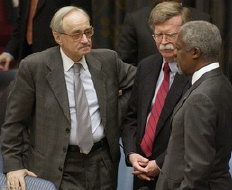Welcome to readers clicking over from the Washington Post’s new PostGlobal feature. PostGlobal highlighted UNSG.org this week as part of its “experiment in global, collaborative journalism” to engage new writers and journalists on global issues beyond the headlines.

Close observers of the U.S. foreign policy team will not be surprised if Ambassador John Bolton brings up the selection of the next UNSG when he next speaks before the U.S. Congress. President Bush’s revelation yesterday that the United States is “really looking in the Far East right now [for someone] to be the secretary-general” could trigger Bolton’s penchant for running to Congress when the Adminstration tries to rope him into a position he doesn’t particularly approve of. Bolton’s principal contribution to the discussion thus far has been his frequently stated view that Eastern Europe deserves a “turn” at the post.
If Bush’s focus is indeed on the Far East, that may signal the government’s interest in either Ban (more likely) or Surakiart (less likely) over Dhanapala and Tharoor. With all due respect, however, this presumes a clear differentiation in Bush’s mind of the diverse regions within Asia (which in UN terms, extends from Jordan to Japan). When asked about the long-rumored potential candidacy of Prince Zeid from Jordan, Bush seemed surprised, but responded that he would not be opposed to a moderate Muslim as UNSG.
“So this is the first I`ve heard of this suggestion [Zeid as a candidate]. And you`ll find that we will work closely with friends and allies to come up with the best candidate, but we won`t be committing publicly, like you`re trying to get me to do,” Bush said stressing that he will not be against a Muslim candidate.
“Not at all, would not be against a Muslim. The criterion I`m for is somebody who wants to spread liberty and enhance the peace, do difficult things like confront tyranny, worry about the human condition, blow the whistle on human rights violations,” he said.
Beyond the rhetoric, a moderate Muslim as UNSG could advance U.S. interests in repairing its image across the world, as was suggested by Steve Clemons several months ago. Whether this is Zeid or perhaps a candidate from a “Far East” Muslim nation such as Indonesia, Malaysia or Bangladesh makes this more than an interesting hypothetical angle. China’s continued discontent with the existing field of candidates but insistence on an Asian nominee only further encourages discussion of possible Muslim candidates.
But the candidacy of a Muslim Arab would be particularly intriguing in how the United Nations and, in its reaction, the United States are perceived in the Arab world. Likewise, the nomination of an Arab candidate will draw attention to Arab governments as global actors.
After the Iraq war, the Arab public has viewed the United Nation as an organization which is powerless and lacks the will and muscle to control world affairs in general and the interests of Arab states in particular. Given this scenario, the nomination of an Arab for the post of UN secretary-general can send the right message to the Arab region. This can also herald a paradigm shift in the way Arab states envisage their role in multilateral institutions.
Notwithstanding the nominal independence of the office, a moderate Muslim as UNSG could encourage greater Arab engagement in institutions such as the International Criminal Court and bring attention to their contributions in development and humanitarian efforts. Successful efforts would feedback into Western perceptions of more culturally, politically diverse societies in the Arab and predominantly Muslim countries.
Despite Bolton’s convictions, the U.S. appears ready to get behind an Asian nominee and could benefit from the region’s vast expanse as to how that is defined. So, the question to raise becomes, where is China on this?
For China, what does “Asian” mean?


 With the Security Council expected to move forward in July on the selection of the next UNSG, all eyes will be on France as it assumes the Council presidency next week. And they are not wasting any time.
With the Security Council expected to move forward in July on the selection of the next UNSG, all eyes will be on France as it assumes the Council presidency next week. And they are not wasting any time.



